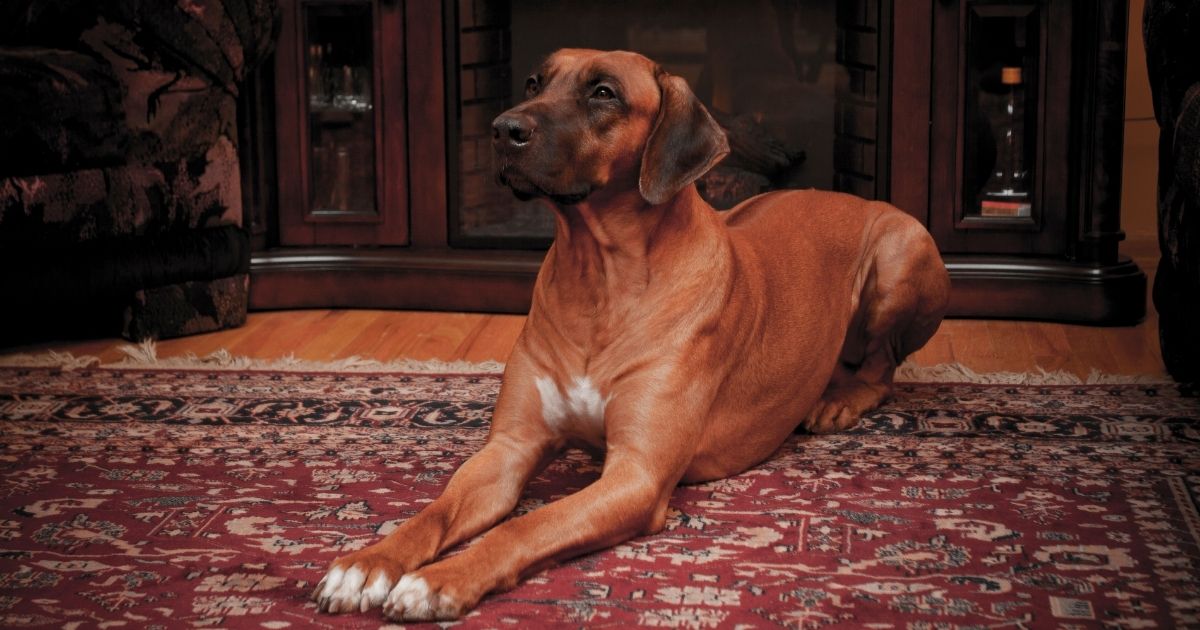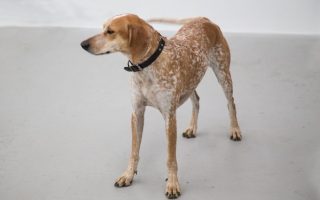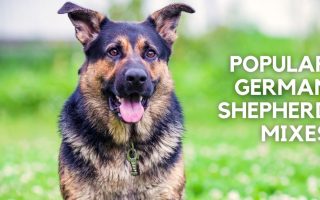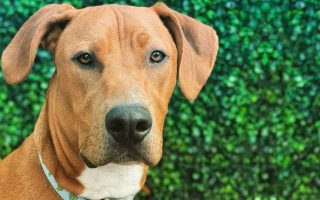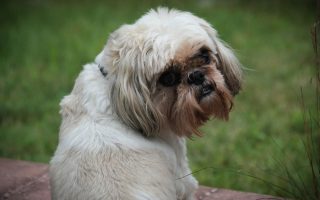The Rhodesian Ridgeback is an African breed that’s well known for the ridge running down its spine.
First developed as a lion hunter, this reputation earned it the name ‘African Lion Hound’.
With its strength and imposing stature, the Rhodesian Ridgeback is not one to underestimate.
As a companion, this breed has prospective pet parents who love it. That said, it wasn’t bred to be a household pet.
This brings up a lot of questions that beg for answers.
If a hunting dog who terrified lions has to become a family dog, then there must be some considerations the potential owner should not overlook.
But, are Rhodesian Ridgebacks good family dogs?
We’ll answer that question by looking into different aspects of this breed, from its basic information to its needs.
Rhodesian Ridgebacks Dog Breed Information
| Height | Male: 25 to 27 inches Female: 24 to 26 inches |
| Weight | Male: 85 pounds Female: 70 pounds |
| Life Expectancy | 10 to 12 years |
| Coat | Short, Shiny, Clean |
| Colors | Light Wheaten, Red Wheaten |
| Temperament | Independent, Intelligent, Aloof, Even-Tempered, Dignified |
| Ideal For | Experienced Owners, Active Owners |
| Hypoallergenic | No |
| AKC Group | Hound |
| Puppy Price | $1,700 – $2,500 |
Rhodesian Ridgebacks Characteristics
| Health | High |
| Grooming | Low |
| Friendliness | Medium |
| Energy | High |
| Trainability | Medium |
A Typical Rhodesian Ridgeback Temperament
The Rhodesian Ridgeback puppy is an excitable and active breed. When it becomes an adult, it mellows down to a self-assured guardian.
The Rhodesian Ridgeback is a good choice for a balanced and quiet guard dog.
It remains loyal, brave, and ready to defend those it loves.
This isn’t an extroverted pooch though. While the Ridgeback loves its family and is calmly affectionate towards family members, it tends to be aloof at strangers.
This has security advantages but can turn into aggression if your Rhodesian Ridgeback pooch isn’t well trained.
Socialize it to curb the level of wariness it has.
Furthermore, this breed isn’t the best fit for first-time dog owners as its independent spirit and stubbornness can become infuriating to the inexperienced.
Even its intelligence may turn into a problem as it would need a lot of mental stimulation to prevent it from getting bored.
Its physical exercise needs can be managed, however, as it is moderate.
This doesn’t mean it is a lazy dog. The Rhodesian Ridgeback may seem laid-back, but it is a force to be reckoned with.
Underestimate it at your peril.
Recommended:
20 Most Dangerous Dog Breeds You Mustn’t Mess With
Are Rhodesian Ridgebacks Good Family Dogs?
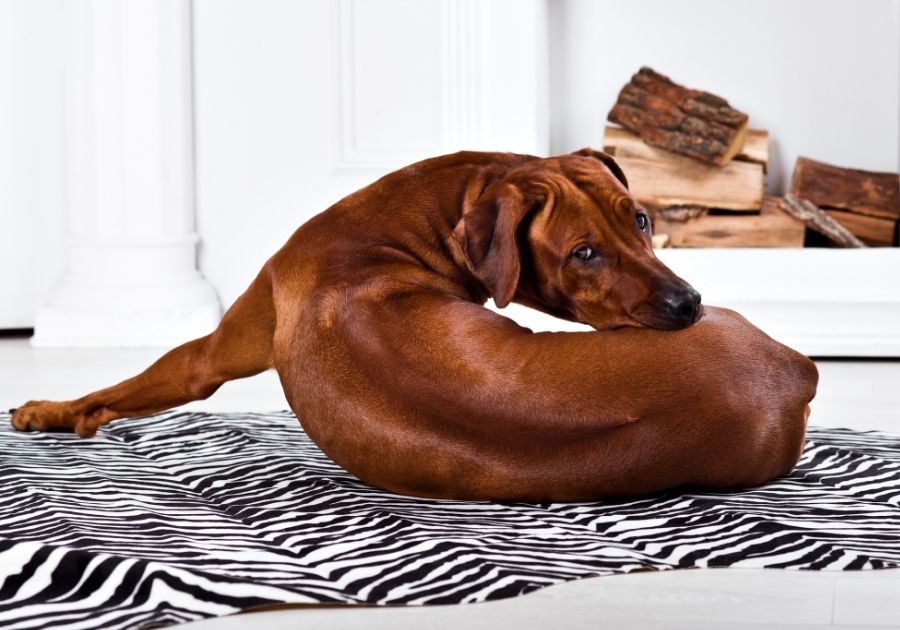
In a nutshell, yes, the Rhodesian Ridgeback is a good family dog. It is loving and loyal towards its family members and can even tolerate the excesses of kids.
The Rhodesian Ridgeback is ready to defend its family with all it has.
Brave, confident, and calm, this lion hunter is a natural protector and watchdog.
Nevertheless, the Ridgeback isn’t a breed fit for everyone.
While it does play the role of a companion now, it can’t be suitable for every family like natural companions will.
First-timers, laid-back owners, and people who want a friendly pooch would fare better with a different breed.
It will only be a good family dog to those that can handle it.
Majorly, the Rhodesian Ridgeback is advisable for people who want guard dogs, watchdogs, and perhaps a hunting companion.
Are Rhodesian Ridgebacks Good with Other Dogs, Cats, and Pets?
The Rhodesian Ridgeback must be exposed early to other dogs if you wish to keep it in a home with multiple pets within.
While the Ridgeback can get along with other dogs, same-sex aggression can occur amongst male dogs, especially unneutered ones.
You must neuter a male Ridgeback to reduce this tendency.
Socialization notwithstanding, we can’t promise that this breed would be friendly with outside dogs.
Its high prey drive may put smaller pets like cats and rodents at risk. Even with good training, you never know when instincts can take over.
If you want other pets alongside a Ridgeback, keep them at a reasonable distance.
Are Rhodesian Ridgebacks Friendly?
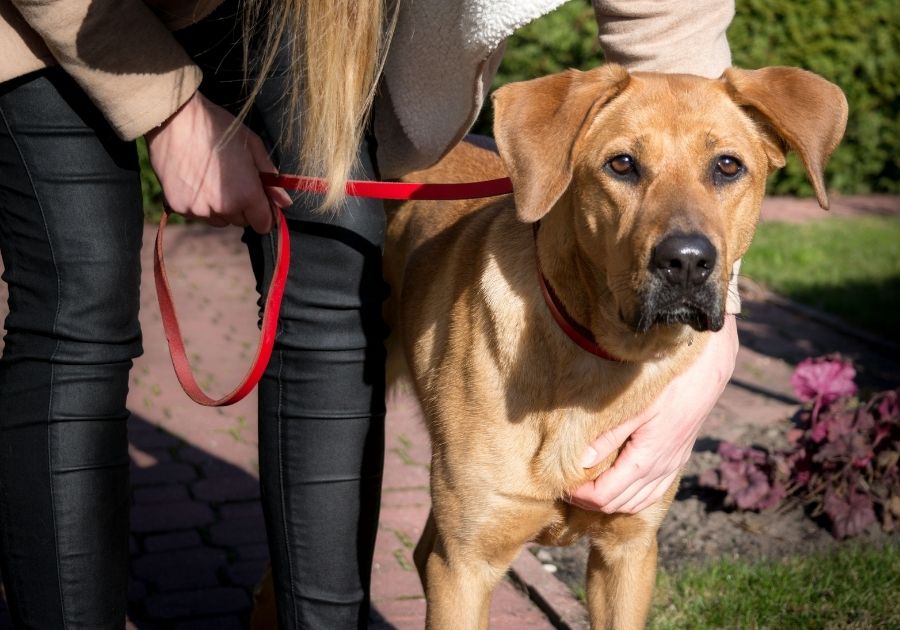
The Rhodesian Ridgeback puppy is very friendly and gets easily happy. However, the grown-up dog isn’t friendly to everyone.
It reserves its friendliness for only family members and would not be keen on greeting visitors or playing with a stranger at a park.
Even with family, don’t expect this breed to show a high degree of enthusiasm.
Like we mentioned above, its wariness has some perks.
You wouldn’t want a guard dog who’d want to befriend an intruder. The wariness also keeps it alert, making it a good watchdog as well.
Good training will prevent the aloofness to develop into aggression, which happens only if this breed isn’t trained enough.
Are Rhodesian Ridgebacks Easy to Train?
The Rhodesian Ridgeback is trainable, but do not expect it to be easy.
The stubbornness, independent spirit, and intelligence of the Ridgeback make training a challenge.
The owner must know how to be firm without being harsh, patient, and calm, with a high level of confidence to match that of the Ridgeback.
Without this, training for this dog breed is doomed before it even begins.
To curb the stubbornness and make it obey you, you need to start early.
Stubborn dogs are easier to handle as puppies, although you would have to learn how to keep them focused despite the restlessness.
Not training your puppy early can have big consequences.
It may get to a moment when stubbornness sets in, leading to undesirable traits like chewing everything in sight, excessive digging and barking, urinating where it shouldn’t, and even running off when unleashed.
As with other stubborn breeds, training must begin with the puppy acknowledging that you’re the leader.
Furthermore, the Rhodesian puppy needs basic obedience training.
Its intelligence will come to good use here as it won’t take time to learn simple commands.
Teach it how to Stop, Sit, Drop an object from its mouth, and even stop attacking someone on command.
This is what would make it a dignified guardian, not an aggressive terror.
Socialization should also start when the Rhodesian is a puppy.
This involves taking it to new places, introducing it to people and also animals.
You can opt for a puppy class where your pooch would learn with some other puppies.
Similar to other dogs, positive reinforcements work better than punitive methods.
Using treats can motivate an otherwise uncooperative pooch, but you should not overdo it. Too many treats can make your dog gain weight.
Rhodesian Ridgeback Grooming Needs & Care
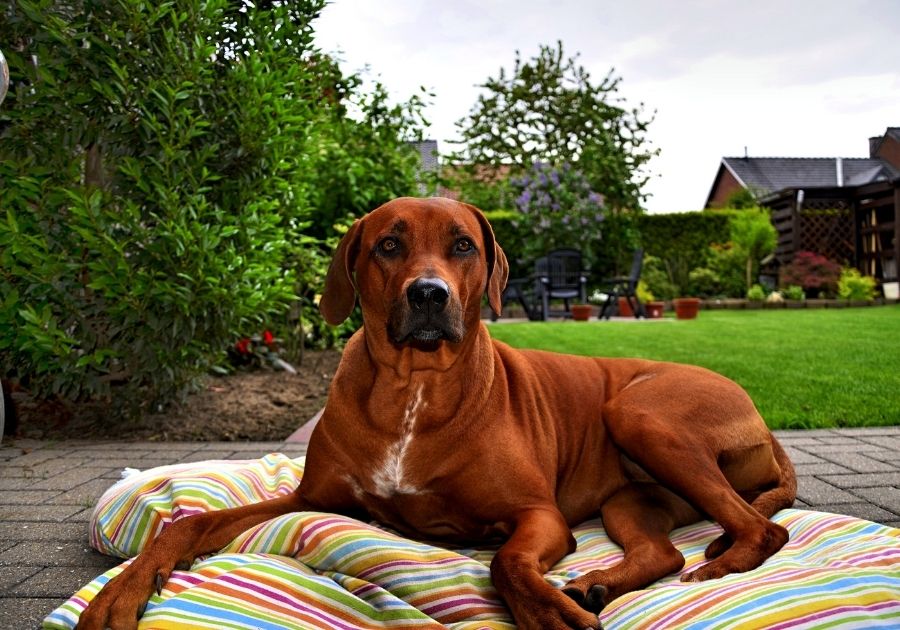
The favorite part of owning a Rhodesian Ridgeback is that it has low grooming needs.
Its short coat doesn’t need much effort to keep clean, and it hardly emits any odor. The Rhodesian Ridgeback sheds a little, which makes it not hypoallergenic.
Regular brushing can help remove the dead hair on its skin.
Because it is odorless and doesn’t get dirty with ease, the Ridgeback doesn’t need too much bathing.
It should get a bath only when it gets stained outside. Wash it with a good shampoo.
Also, you need to clean its ears. The Ridgeback has droopy ears which are prone to infection, so it needs to be wiped regularly.
Ear cleaning also reduces the amount of wax in the ears.
Do not ignore any abnormal signs like smelly ears or redness. When you notice this, get your dog treated.
Another part that needs care is the nails. Long nails make it uncomfortable for the dog to move around, and may lead to a tear in your carpet.
This activity must be done with care as no dog would appreciate getting injured on the paws.
Check out this guide on how to cut an uncooperative dog’s nails if your Ridgeback is not cooperating.
You can also hire a professional groomer if you’re not keen on doing it yourself.
Finally, give it good dental care to prevent tooth problems and an excess of tartar.
This should be done with a good toothbrush and vet-approved toothpaste.
Common Health Problems
Compared to other Hounds and some dogs, the Rhodesian Ridgeback’s lifespan isn’t too long.
The average life span of dogs falls between 10 and 13 years.
Meanwhile, the Rhodesian Ridgeback is known to live up to 12 years, which just falls within the average.
It isn’t all bad news though. The Ridgeback can live a healthy life with little vet visits when well-bred and taken care of.
You must be conscious of the diseases this breed can get even before shopping or adopting one.
Some of the common conditions include:
Hip and Elbow Dysplasia
The hip and elbow dysplasia are both joint issues, but they manifest in slightly different ways.
Hip dysplasia occurs when the hip joint is loosely fitted while elbow dysplasia happens when the elbow isn’t well-formed.
Both have similar symptoms, however, in that they affect a dog’s movement, can cause pain and may make the dog unwilling to move.
When untreated, both illnesses can render a dog lame.
Dermoid Sinus
Dermoid Sinus is a skin condition that Rhodesian Ridgebacks are known for.
It occurs when the skin and the nervous system don’t separate well when the embryo is developing.
It isn’t often present at birth but may not be apparent till the dog grows.
Symptoms include an opening on the skin that is vulnerable to infection.
Deafness
Deafness is usually inherited and can be avoided if you ensure that the parents of the breed you wish to get do not carry this trait.
It hardly shows during the puppy stage but may become apparent during adulthood.
Deafness has no particular cure but the affected dog can be taught to live a normal life.
Hypothyroidism
Hypothyroidism occurs when the dog’s thyroid gland malfunctions by not producing enough thyroid hormone that the dog’s body needs.
Ridgebacks are very prone to this illness. Symptoms include dry skin, hair loss, unexpected weight gain, and even some undesirable behaviors.
Cancer
The Ridgeback can develop some dangerous tumors, much like humans do.
It can be fatal if left untreated and should be treated as an emergency.
Symptoms of cancer in the Rhodesian Ridgeback include swelling, injuries that don’t heal, and some unexplained bumps.
Heart issues
Different factors can cause heart complications in dogs, but the result is the same. The heart gets weakened.
Symptoms of heart complications in dogs include breathing difficulties, coughing, general weakness especially after exercising, and paralysis in worst cases.
Bloat
Bloating is a fatal illness that usually affects dogs of bigger sizes. It seems like a minor disease but is a fast killer.
Bloating occurs when the dog’s stomach swells up as a result of food and other fluids that fill it.
If you notice your dog’s stomach swelling, rush it to the vet.
Diet & Excercise Needs
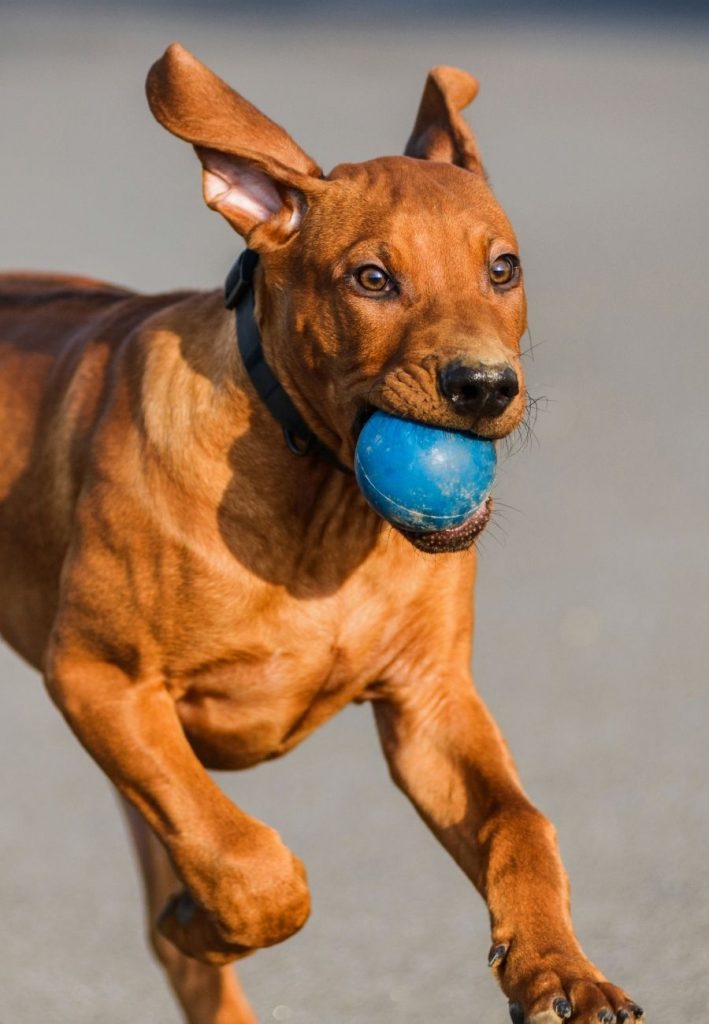
Feeding and exercise are two other doggy needs that must not be overlooked as they contribute to the dog’s wellness.
Feeding the Rhodesian Ridgeback involves picking up the right products for its diet.
It must be high-quality dry dog food with all the right nutrients in place.
Protein is the most needed nutrient, as well as minerals, vitamins, and a few others. Keep your pooch hydrated too.
Obesity is an issue with the Ridgeback, especially as it often has a huge appetite.
Ensure that you measure its meal accordingly and keep treats at a minimum.
Exercise also helps maintain the weight level, as well as keeping it going.
The Ridgeback that works or spends its time outdoors more would need lesser exercise than its apartment counterpart.
Either way, at least 40 minutes of exercise should be enough. Supplement physical activities with a good dose of mental ones.
Is the Rhodesian Ridgeback Right For You?
With all we now know about the Ridgeback, do you think it is right for you?
You alone hold the answer to this question, but a brief recap of the Rhodesian Ridgeback’s pros and cons can help.
Pros
- Good watchdog and guard dog.
- Highly energetic and can adapt to indoor living.
- Grooming the coat is easy.
- Moderate exercise level.
- Loyal and protective.
Cons
- Not suitable for first-time owners.
- Not hypoallergenic.
- Can be stubborn and loves being independent.
- Can be overwhelming for toddlers.
How much is a Rhodesian Ridgeback puppy?
The Ridgeback is an expensive dog breed when you want to shop for one.
The average price range of a Rhodesian Ridgeback pup falls between $1,700 to $2,500 but may vary depending on many factors.
What is the Rhodesian Ridgeback known for?
The Rhodesian Ridgeback is an African lion hunting dog that’s recognized by the ridge that runs down its back, a physical trait it got from its African parents.
Are Rhodesian Ridgebacks aggressive?
Without proper socialization, the Rhodesian Ridgeback can become aggressive towards strangers.
The unneutered male Ridgeback might also get aggressive towards other male dogs.
Unless you need your pooch to breed, ensure you neuter/spay it and give it enough socialization.
Is a Rhodesian Ridgeback good for first-time owners?
The Rhodesian Ridgeback is not recommended for first-time owners because of its size and its stubbornness.
In the hands of an inexperienced owner, it may get out of control with bad behaviors, including aggression.
Do Ridgebacks like to cuddle?
Rhodesian Ridgebacks can be good apartment dogs and are known to be affectionate with family members, but they are not good cuddle buddies.
Are Rhodesian Ridgebacks smelly dogs?
Rhodesian Ridgebacks have odorless coats that do not require regular bathing but can get dirty and smelly if they get into the mud. However, that isn’t a usual occurrence.
Final Thoughts
The Rhodesian Ridgeback is a good hunter and guardian but has some limitations in the role of a companion.
Not the family dog for everyone, the Rhodesian Ridgeback needs firm training from a confident and experienced owner.
In good hands, this breed becomes a calm, devoted, and loving household pet.
You May Also Like:
10 Popular Rhodesian Ridgeback Mixes (with Pictures)
References & Notes
- Wikipedia: “Rhodesian Ridgeback”
- American Kennel Club: “How Long Do Dogs Live?”

